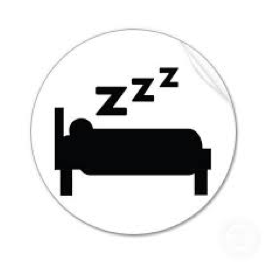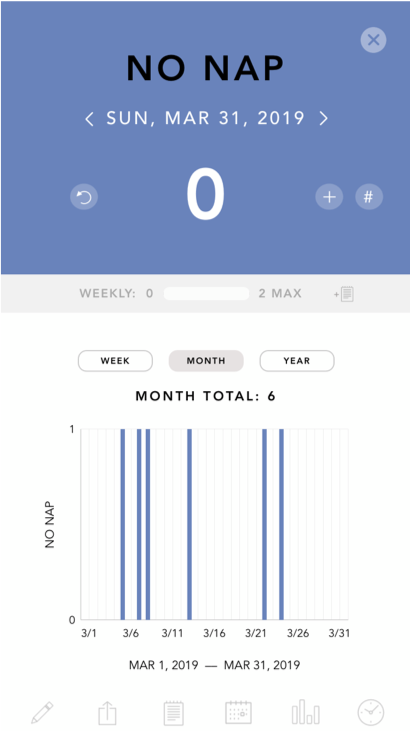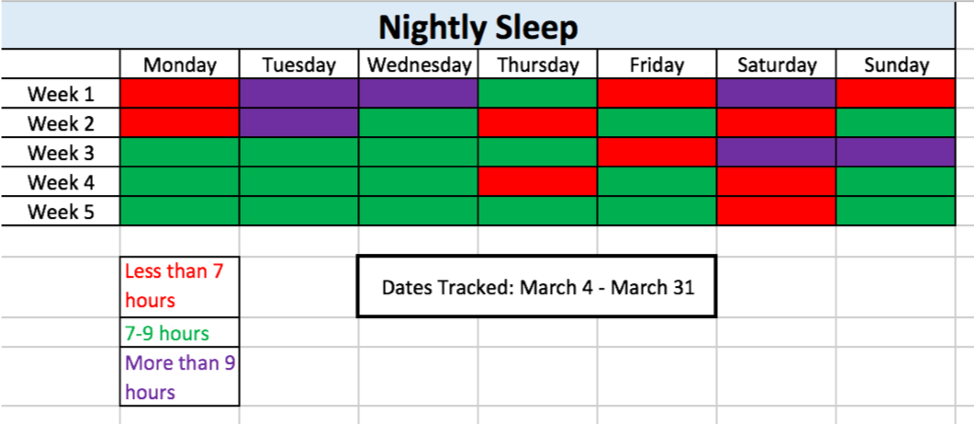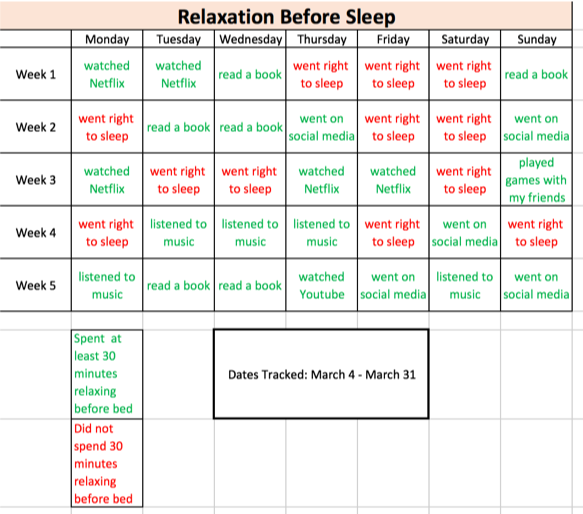“Your life is a reflection of how you sleep, and how you sleep is a reflection of your life.”
– Dr. Rafael Pelayo

The Importance of Sleep
Sleep is an integral part of every person’s life and sometimes is not treated with as much importance as it deserves. Many people go throughout life prioritizing other tasks and responsibilities, often forgetting about one of the most vital elements in life: sleep. We all know the recommendation of getting 8 hours of sleep per night, but how many of us truly follow that? From my personal experience, I have struggled with maintaining healthy sleeping patterns and I know I am not alone in this struggle. For college students especially, sleep is sometimes disregarded and set aside to make room for school, work, and a social life. While juggling all of these parts of our lives, it’s so hard to go to bed early, take time to de-stress before bed, or resist the temptation to frequently nap. Recently, I have changed my mindset on sleep because I have come to realize that sleep patterns can make or break you. Sleep is what fuels you for the day and without fuel it is hard to accomplish things productively or even accomplish anything at all. Your brain and body need sleep in order to contribute to physical and mental well-being. The mistake I have made, and I am sure many of you have as well, is discrediting sleep for everything it does for us. I challenge you to think of sleep with less indifference and more importance.
Stuck in a Rut
Since I began college two years ago, creating and sticking with a healthy sleeping pattern has been a struggle for me. Currently, my sleep struggles are caused by many factors. I am balancing 7 classes (17.5 credit hours) in school, a part-time job, and a social life, trying not to fall behind in any of the responsibilities that go along with these aspects of my life. This has led to me being stuck in a rut when it comes to healthy sleeping. School is definitely what affects me most when it comes to my sleeping patterns. Like most college students, napping has made a comeback in our lives from early childhood naptimes. Before I began to work on my sleeping habits, I napped too often and for too long. I took naps at least four times a week, each nap lasting 2 or more hours. Also, I always went to bed extremely late and either woke up very early for class or ended up sleeping well past noon. When I did go to bed, I felt very tense from the long day I had and was not able to free myself of the stress before I slept. I used to feel trapped by my sleep patterns and thought there was no way to change them to fit my schedule. I am here to tell you that it really is possible to do. Instead of letting your sleep control your life, take the reins yourself and control how you sleep, and therefore how you will live.
The Book that Woke Me Up
At first, when choosing my goal for this project, I didn’t realize that my sleeping habits were the root of my problems and holding me back from other goals I have been trying to achieve. Originally, I wanted my goal to be based on performing better in classes and strengthening my professional development for my future career as a Certified Public Accountant (CPA). So, I chose the book, How to Win at College by Cal Newport. This title sounded perfect to me. I am an extremely competitive person, and since college is such a huge part of my life right now, I was drawn to the idea of being a winner at college. I figured this book would help with my motivation to perform better in classes and develop my academic and career skills. However, I found a takeaway from the book I wasn’t even planning on stumbling upon. How to Win at College by Cal Newport is a compilation of 75 tips for success from the country’s top college students to give advice from a first-hand perspective. As I continued to read the book, I began to notice that a lot of the tips were about sleep. This made me realize that what I really needed to work on is my sleep habits, because that is what hinders achieving greater success in everything I do. This book woke me up to recognize the inadequate sleeping patterns I had in my life and started me off on the right foot on my path to fixing them.
My Goal
Taking into consideration my life and this book, I decided on a goal centered on sleep. My specific goal is to improve my sleeping habits through focusing on not napping, monitoring hours of sleep I get at night, and being able to fall asleep relaxed in order to have more energy and be more productive during the day. If you have the same or a similar goal, feel free to follow along as I share my journey of working to achieve this goal during this semester. I went about achieving this goal through the use and tracking of three strategies. As these strategies were implemented in my daily life, I was confronted with challenges and learning outcomes along the way, many of which can provide knowledge for you as you progress in college or any other stage in your life.
No Nap, No Problem
Inspired by Rule #14 “Never Nap” from How to Win at College,I implemented the strategy of trying to cut down on napping. The book says, “sleeping in the afternoon or early evening takes up large amounts of your limited time, it makes you drowsy and unfocused, and it throws off your regular sleep schedule” (Newport 39). I have a bad habit of coming home right after an 8am class and taking a nap until 1pm. This sometimes breaks up my focus and leads to me not being able to sleep later that night. The book taught me that if I avoid napping, I can retain more focus and my energy for the day will be much higher, leading to heightened productivity.

For a span of 4 weeks, I tracked my napping habits with the Done App which helped me limit the amount of naps I took. With the app, I set 2 as the limit of naps per week. However, as the project went on, I napped less and less, decreasing my amount of naps per week to 1 or none. Throughout the whole month of March, I only napped 5 times, which is definitely an improvement. I still napped occasionally, but only ended up taking 6 naps the whole month. The challenges I faced with this strategy were not being able to keep my eyes open in the morning and feeling too tired to go on with my day without a nap. I overcame this challenge by working out or just showering when I felt the need to nap. Both of these replacements woke me up and energized me without wasting hours during the day asleep. So, the key to successfully using this strategy is finding substitutions for naps that enliven you during the day.
This strategy helped me meet my goal because by refraining from taking naps, I improved my nightly sleeping habits. Not taking naps ensured that I had more energy and was more productive during the day, due to being better rested from the night and not wasting the limited time I have during the day. Also, tracking the use of this strategy helped me maintain my focus by providing a visual representation of my daily and weekly progress.
Now, it has been over a week since I took a nap and as a side-note, I have become more fit by going to the gym to work out instead of napping. This proves how focusing on improving your sleep can contribute to positive improvements in other areas of your life!
Consistency is Key
In addition to avoiding napping as much as possible, it is important to focus on the sleep you receive at night as well. The sleep you get every night should be a consistent number of hours, not varying under or over this designated amount. This goes along with Rule #42 “Don’t Undersleep, Don’t Oversleep” from the book. I have learned that keeping your amount of sleep consistent every night is crucial to functioning and performing properly during the day. Too much or too little sleep can both lead to intense tiredness and lowered productivity. The book compares us to a machine saying, “Treat your body like a machine – give it exactly what it needs to perform best, not any more, not any less” (Newport 106). I really like this analogy and thought about it often while trying to apply the strategy of consistent nightly sleep to my life.
Prior to this course project, my nightly sleeping patterns were extremely
inconsistent. On days before I had an 8am class or days of going out on the
weekends, I would sometimes sleep 4 to 5 hours. Some nights when I did not have
early class the next morning, I would sleep 10+ hours. Sometimes I would sleep
7-9 hours but usually it was either very much or very little sleep I was
receiving at night. This rollercoaster of sleep was a hard habit to break,
probably the hardest strategy for me to apply. I faced the challenges of having
a lot of homework that restricted me from going to bed early and waking up at a
reasonable time to make sure I didn’t oversleep. I ended up working out these
obstacles by completing more homework earlier in the day so that I could have
an earlier bedtime and meeting my friends for breakfast at early times to force
me to wake up and not oversleep when I don’t have class.

This strategy helped me meet my goal of improving my sleeping habits because it ensured that I am maintaining a consistent amount of sleep per night. This translated to being more energized and productive during the day, which was also part of my goal. I tracked my progress of this strategy with an Excel tracking template. This provided me with a clear representation of my progress in terms of my nightly sleeping patterns. I recorded when I got too little, too much, or an average amount of sleep. As the weeks went on, I tried keeping my sleep between 7-9 hours per night and was pretty successful. As the weeks went on my sleep became much more consistent and by the fourth week, I only under slept one time.
Now, I am continuing to sleep 7 to 9 hours every night and I feel a major difference in how I perform and go about my everyday life. I like how I have more of a routine now that I can stick with, but understand that every once-in-a-while I will have nights when I will get a little under or over that 7-9 hours. I have felt more capable of what I can do because if I can fix my messed-up nightly sleeping habits, I can definitely achieve other goals I have in my life!
Relax Before Rest
The final strategy I incorporated follows Rule #72 “Relax Before Sleep” from How to Win at College. I have adopted the habit of relaxing before rest in order to free myself from my stressful day. It is important to relax for at least half an hour before you go to sleep. After you pass your daily work cut-off point, never move right into sleep. Going to bed with the stresses of the day fresh on your mind translates into a harder time falling asleep and inhibits your recovery from the pressures of the day. To support this strategy the book states, “when you consistently fall asleep relaxed you sleep better, are happier, and have more energy the next day” (Newport 182).

Before this strategy became part of my life, after finishing up homework for the night I crawled right into bed. This contributed to me staying stressed out for a while, with all my responsibilities weighing down on my mind. I would sometimes wake up in the middle of the night remembering another thing I need to do during the week and would not be able to fall back asleep for a while. The way I went about using this strategy was finding different ways to unwind before bed. My methods mainly included listening to music, watching Netflix, going on social media, and reading books, all of which distracted me from stressful thoughts.
This practice contributed to meeting my goal because relaxing before sleep led to me sleeping better, and ensured that I am happier, refreshed, and energized the next day. These positive feelings during the day made me more productive and able to complete tasks during the day much more efficiently. Hence, by putting the day’s stressful thoughts aside before I go to bed, I can achieve better success with good sleeping habits and with productivity when I am awake during the day.
I tracked my progress with an Excel tracking template in which I recorded if I relaxed for 30 minutes before sleep, and if so, how I spent that time relaxing. This was beneficial for me because I could see how different activities relaxed me compared to others. I was also able to release the stress from the day and go asleep with a lighter mind.
Takeaways
How to Win at College by Cal Newport taught me how to be a smart sleeper. The book not only taught me through reading it, but by putting its “rules” into practice in my daily life I was able to truly value the positive effects of good sleeping habits. One specific takeaway I received from this project is that it is possible to get too much sleep. I never realized how napping for so many hours during the day or sleeping for over 10 hours at night can be a negative thing. I always just tried to get as much sleep as I could whenever I could. Now I know that is not what I should aim for because it takes away time during my day when I should focus on being productive and it
can lead to being more tired in the long-run with inconsistent sleep patterns. A second takeaway from this project is that when working to accomplish a goal, the use of Excel, the Done App, and other tracking systems is extremely beneficial. I credit most of my success with this project to the tracking techniques I used. They provided me with a visual and detailed way of tracking my progress, which made me more motivated to achieve my goal. A third takeaway I received from this project is that I am more capable than I give myself credit for. I always felt so stuck in my ways when it came to sleep and never believed that I had the power to change my sleep habits. I came to realize that it is really not too difficult to put forth effort if I really want to see change. I was very aware of myself and how I was sleeping, leading me to understand myself on another level.
Now I feel more able and motivated to achieve other goals in my academic, social and professional lives. From my experience, you can see that from just a little dedication and effort, positive results will emerge. It is evident how sleeping habits are at the core of success. With better sleeping habits, I have improved my fitness, academic performance, and overall mindset, and you can, too! With the help of How to Win at College by Cal Newport, I most definitely achieved my goal of improving my sleeping habits through focusing on not napping, monitoring hours of sleep I get at night, and being able to fall asleep relaxed in order to have more energy and be more productive during the day.
As You Go Forward…
What I want you to keep with you as you go forward is to regard sleep with less indifference and more importance. It is so crucial to pay attention to how you are sleeping. If you strive to improve your sleeping habits I highly suggest implementing the three strategies I used (not napping, keeping nightly sleep consistent, and relaxing before rest) because all three truly fostered positive change in my life. I can attest to the fact that if you keep practicing these three strategies and make them a natural part of how you live, you will continue to see results. This goal doesn’t require perfection: I still nap sometimes, occasionally go right to sleep without relaxing, or keep too much or too little sleep some nights. The goal just calls for improvement, and if you define your problem area and work toward change, improvement will follow!
Just remember:
Winning at college (and life) starts with winning sleeping patterns!

